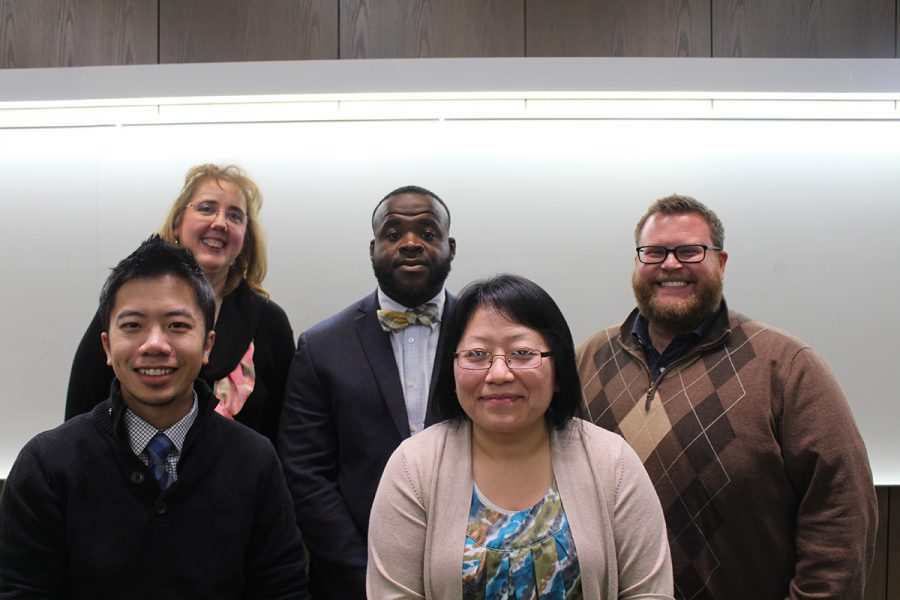Students, faculty gather for (N)eau Hate forum to discuss repercussions of 2016 election, campus climate
Opinions divided over topic of outreach, students fear marginalized communities aren’t being heard
Photo by Gabriel Lagarde
(Back row L-R) The (N)eau Claire panel speakers included Melissa Bonstead-Bruns, professor of sociology, Dennis Beale, student success coordinator, Chris Jorgenson, Women’s and LGBTQ Resource Center coordinator. (Front row L-R) Dang Yang, forum moderator, and Caitlin Lee, equal opportunity specialist. Not pictured: Student speakers Alajandra Estrada and Whisper Kappus-McDew.
December 5, 2016
Blugolds came together to discuss the concerns of marginalized communities and the current climate on campus during the (N)EAU HATE open forum in Centennial Hall, Thursday evening.
“The goals are twofold,” event facilitator Dang Yang said, opening the panel discussion. “First and foremost, to discuss the reasons why individuals from marginalized communities may feel genuine fear and anxiety following the results of the 2016 election. The second is to elevate those marginalized voices in this discussion.”
Members of the Office of Multicultural Affairs, Blugold Beginnings, Women’s and LGBTQ Center and the Affirmative Action Office organized the forum.
A panel of speakers discussed topics ranging from the current learning environment on campus for marginalized students, the repercussions of the 2016 election and President-elect Donald Trump’s rally at Zorn Arena in early November and exploring ways to incorporate the campus community at large into the conversation.
The event, which ran from 4-6 p.m., functioned primarily in three segments: A moderated conversation by members of the panel, a time for attendees to split into smaller groups and discuss the issues among themselves and a Q and A session that gave attendees an opportunity to ask the speakers questions directly.
Caitlin Lee, a speaker at the forum and the equal opportunity specialist on campus, described the election as a moment where her trust in her community, both in the Chippewa Valley and at a national level, was shaken.
“It is a life-changing election for me. As a person of color, what this election told me is that I had too much hope,” she said. “My disillusionment failed. America didn’t do the greater good. To me, the message was very clear: You don’t matter. Your fears don’t matter. Your lives don’t matter.”
During the discussion, Yang outlined a report by the Southern Poverty Law Center, which compiled 867 hate incidences in the ten days following the election as well as a national survey by 10,000 educators indicating widespread spikes in student anxiety and derogatory behavior in classrooms across the country.
During the final Q and A section, attendees voiced concerns inclusivity events of this nature are too isolated. Roughly 90 individuals attended the forum, which represents less than one percent of the student body, and, on top of that, these individuals were primarily representative of multicultural organizations, not the campus at large.
Doug Matthews, department chair of psychology, said efforts should be made to invite groups around campus, especially ones with differing viewpoints, in order to foster an environment where the discussion can be held.
“You need to have the full spectrum of thought engaged,” Matthews said. “Many people would like to move things forward and the only way we can do that is through everyone being at the same table, trusting each other and moving forward.”
Associate Director of the Office of Multicultural Affairs Charles Vue said he agrees that conversations with people of opposing viewpoints has to be encouraged, but the concerns and fears of marginalized students cannot be invalidated or suppressed by such conversations.
“Students have the right to feel what they feel,” he said. “Whether those fears are valid or not is not the question, they have a right to express themselves.”
Kab Vwj, a senior organized communication student, criticized suggestions that members of marginalized communities have to make outreaches to other communities on campus and close the gaps in these discussions.
“People of color have started this conversation over and over and we’re still at square one,” she said. “Students of color have been fighting white supremacy in this institution for a lot of years. It’s always faculty and students and administration of marginalized identities who constantly have to rip out their hearts and souls for white people for them to understand that this s**t exists.”

